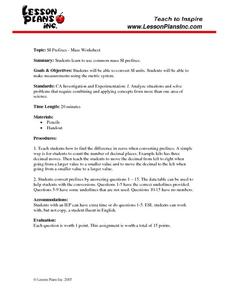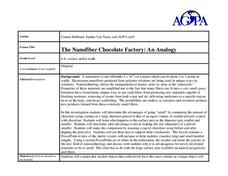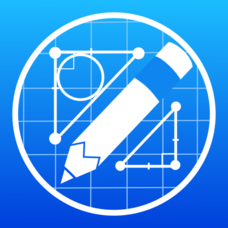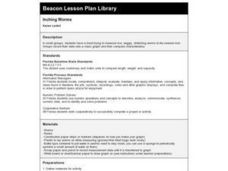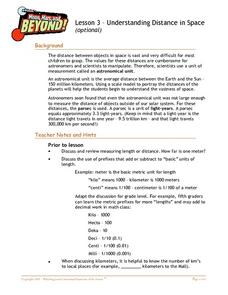Curated OER
SI Prefixes and Mass
In this SI prefixes and mass worksheet, students are given measurements of mass and they covert to the given measurement by moving the decimal the proper number of places to the left or right.
Curated OER
The Nanofiber Chocolate Factory: An Analogy
Students investigate Nanotechnology. In this physic's lesson plan, students evaluate a hands-on model made from chocolate syrup and pretzels to determine the advantages of size. Students weigh chocolate syrup to determine it's...
Curated OER
Show Me the Way To Go Home
Students place a pencil perpendicular to the ground and trace its shadow between 11:30 AM and 12:30 PM. They measure the length of the shadow, periodically over several hours, in either English or Metric units. Using the data, they find...
Curated OER
How Long is a Slinky?
Students take part in a variety of measurement tasks. Students measure the length of a slinky. Students work out how many slices of tomato will fit around the edge of a pizza. Students measure the label from a can accurately.
Curated OER
Make a Zoo
In this unit students work in groups to find out about an endangered animal species. They design a zoo enclosure for the animal and build a scale model. Together the class constructs a zoo! In the process of planning and building the zoo...
Curated OER
Mr. Peanut Lab
In this peanut lab, students examine 10 different peanuts and take a variety of measurements. Using their measurements they answer 3 analysis questions.
Curated OER
Decimals, Meters, Centimeters: Taking It Further
In this decimal, meter and centimeter worksheet, students analyze units of measurement and rank them in order from smallest to largest. For the hands-on learner, students may cut out the number cards, move them around, and then place...
Curated OER
Decimals, Meters, Centimeters: Worksheet 7
In this meters worksheet, 6th graders compare units of measure written in centimeters and meters. For the kinesthetic learner, students may cut out the twelve numbers. Students match centimeter units to an equivalent meter unit. There...
Bytes Arithmetic
Geometry Pad+
Graphing paper, pencil, ruler, protractor, and compass, all get replaced or supplemented with this dynamic geometry application. Here, you can create, move, and scale many different shapes, as well as, explore and change their properties...
Virginia Department of Education
Solar System Model
How many planets can you name? Did you get all 13 in our solar system, including the dwarf planets, or were you surprised when you read there are 13 planets? The lesson helps scholars understand the scale of the universe including the...
National Nanotechnology Infrastructure Network
The Micro and Macro World Around Us
Don't let your eyes play tricks on you ... use scale to keep your eyes in check! Young scholars observe images without scale and try to identify the structure. Then, they look at the same image with a scale bar and assess whether their...
Curated OER
Scale Matters
Third graders study the meaning of the digits an any whole numbers with up to 3 decimal places. They order decimals with up to 3 decimal places and perform measuring tasks, using a range of units and scales.
Curated OER
Perimeter
Students use their hands, feet, computer, and rulers to measure the perimeter of objects. In this measurement lesson plan, students measure objects around the room and computer generated shapes.
Curated OER
Inching Worms
Third graders have a blast trying to measure live, wiggly, stretching worms to the nearest inch. Groups record their data onto a class graph and then compare characteristics. They share their findings with the rest of the class. Fun...
Curated OER
Is It There?
Students participate in a instructional activity designed to illustrate these concepts using simple materials. They use Science process skills to observe, measure, predict, make inferences, and communicate while completing the activity....
Curated OER
Understanding Distance in Space
Pupils discover the vocabulary used for distances in space and review measurement units and instruments before creating a scale model of the planets. They determine how to calculate the relative distances between the planets using a...
Curated OER
Boxing On
Students participate in five center activities in which they construct three dimensional objects using cubic centimeter manipulatives such as sugar cubes and toothpaste boxes. They determine the volume of the objects. They build a model...
Curated OER
Metrics1 Word Search Puzzle
In this math activity, students look for the words that are related to the concept that is reviewed in the sheet. They also acquire new vocabulary.
Curated OER
The Shadow Knows - Measuring A Telephone Pole
Third graders attempt to determine the height of a telephone pole or tree without climbing to the top.
Curated OER
Measuring Angles
Third graders describe an amount of turn from a particular position to another using the 'circular' benchmarks of 0, ++, ++, ++, and full turn. Estimation language such as 'just about', 'between', 'not quite', 'just over', and similar...
Curated OER
Metrics 1 Word Search Puzzle 2
In this literacy learning exercise, students look for the words that are related to the concept that is reviewed in the sheet. They also acquire new vocabulary.
Curated OER
What Can You Learn From A Mealworm?
Students collect data from mealworms. In this science and math lesson plan, students gain an understanding of collecting metric data using mealworms.
Curated OER
Surface Area with Polydrons
Students explore measurements by analyzing geometric shapes. In this surface area lesson, students identify the terms volume, weight, perimeter and area in order to find the requested measurements of specific polygons. Students utilize...
Curated OER
The Time of Man
Students demonstrate visually Mankind's relative place on the earth's timeline. They familiarize themselves with the use of the metric system in measuring and producting a timeline.


